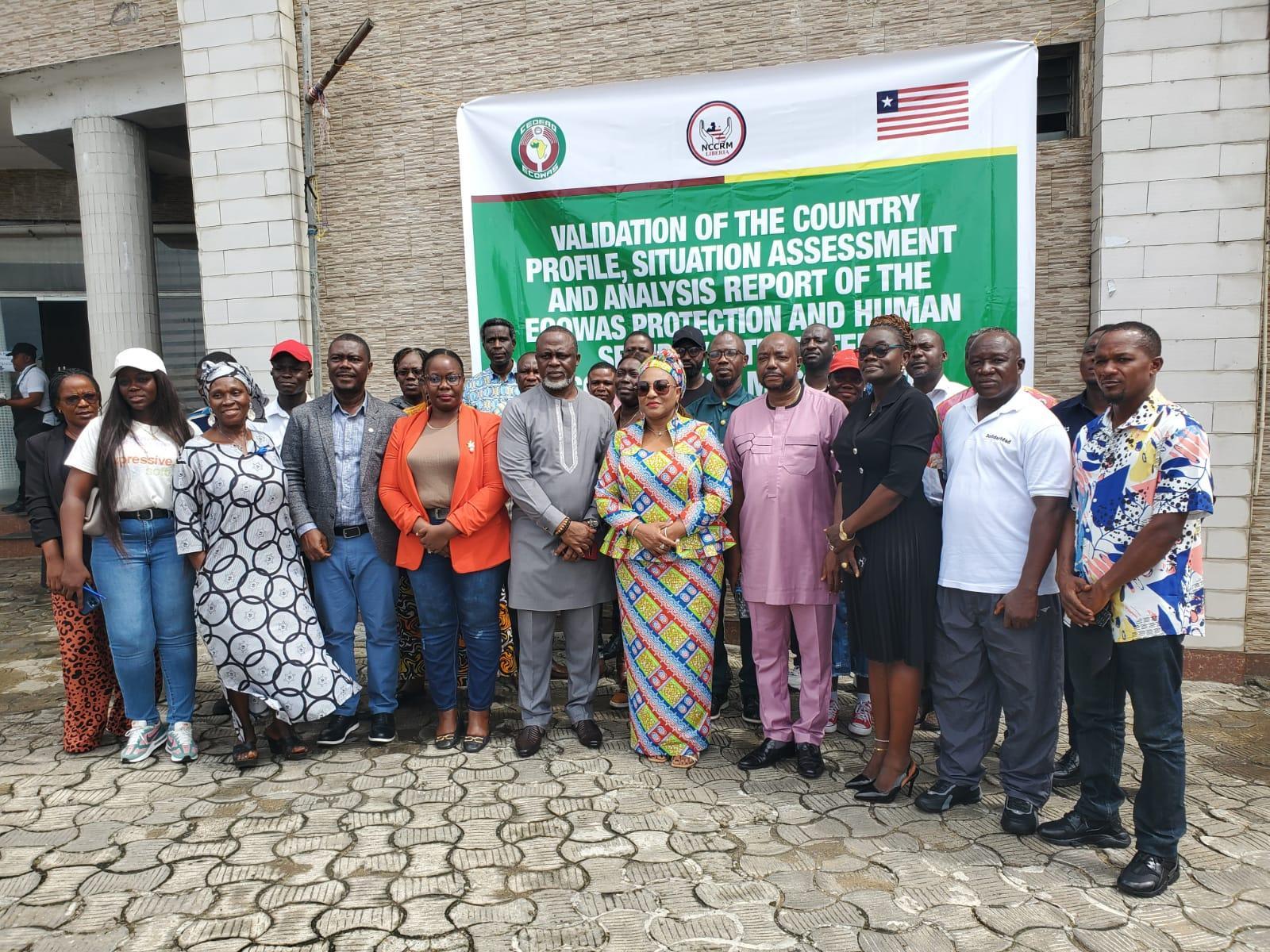Africa-Press – Liberia. The validation of Liberia’s National Protection and Human Security Profile took center stage on Friday, May 30, 2025 as stakeholders gathered in Monrovia to assess and finalize the long-awaited country assessment report under the ECOWAS Protection and Human Security Integrated Coordination Mechanism (ECO-PHSICM).
The meeting, convened by the National Center for the Coordination of Response Mechanism (NCCRM) with support from ECOWAS, brought together security institutions, civil society, development partners, and government representatives to give critical input to the document which outlines Liberia’s protection and human security architecture, vulnerabilities, and policy gaps.
Delivering the opening remarks, ECOWAS Ambassador to Liberia, Josephine Nkrumah, urged participants not to see the workshop as just another routine event, but one that directly speaks to national survival and resilience.
“Whether it is us in our presence or people we are related to… the essence of ECO-PHSICM and today’s workshop is very important to all of us,” Ambassador Nkrumah declared. “This is about national security and human protection it is our collective responsibility.”
Ambassador Nkrumah emphasized that the validation process is not just an administrative formality, but a strategic opportunity to unify institutional efforts around vulnerable populations.
She highlighted the need to decentralize interventions through key actors like the Ministry of Internal Affairs, stressing that true protection only reaches the people when local structures are fully engaged.
Amb. Nkrumah echoed the ECOWAS 50th Anniversary theme — “Stronger Together for a Better Future” — reminding all that the power of integration lies not in theory, but in collective action.
“ECOWAS is not an ECOWAS of states. It is an ECOWAS of the people,” she reiterated. “Let this process be about building a resilient society, for all.”
The draft report, produced by a national consultant, reflects a comprehensive examination of Liberia’s human security vulnerabilities—particularly for women, children, refugees, IDPs, and survivors of gender-based violence. While acknowledging existing frameworks and national policies, the report underscores persistent implementation gaps, institutional capacity deficits, and weak coordination among stakeholders.
NCCRM Arthur Bestman, Acting Executive Director, described the meeting as the culmination of a process that began with high-level engagements in 2022, followed by a series of technical consultations in 2024. He emphasized that stakeholder input at this stage is what gives the report its credibility.
“We expect nothing less than your valuable contributions,” Bestman told the audience. “This must not be another document collecting dust. It must serve as a one-stop reference for government and partners to act on our shared protection priorities.”
He reminded participants that the ECO-PHSICM framework is not an external imposition but a homegrown, ECOWAS-led mechanism rooted in legal texts, including the ECOWAS Conflict Prevention Framework and the Supplementary Protocol on Democracy and Good Governance.
Representing the civil society, National Network Coordinator of WANEP-Liberia, Philip M. Kollie, called on stakeholders to treat the process with the seriousness it deserves. He referenced findings from the Independent National Human Rights Commission as a sobering reminder of daily violations affecting vulnerable groups.
“This document must be more than a validation,” Kollie said. “It must be a tool for real intervention. We in civil society are fully committed to supporting its implementation.”
In a remarks, Amos N. Tubor from the ECOWAS National Office at the Ministry of Finance and Development Planning(MFDP), reminded participants that the discussions from the workshop will be elevated to the highest technical levels of ECOWAS governance — the Administration and Finance Committee (AFC).
“The decisions we make here will shape ECOWAS policy direction and support,” Tubor affirmed. “Let’s think about those who aren’t in this room — the voiceless, the vulnerable. This report must speak for them.”
As the session moved into the technical review phase, stakeholders were encouraged to “critically interrogate” the draft document—scrutinizing overlap in institutional roles, data gaps, and priority intervention areas. Participants emphasized the need for a clear roadmap on implementation and accountability mechanisms post-validation.
For More News And Analysis About Liberia Follow Africa-Press






